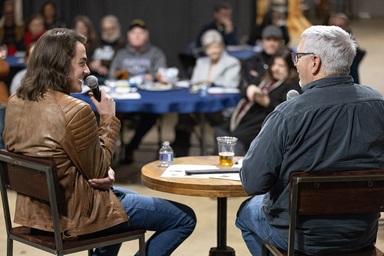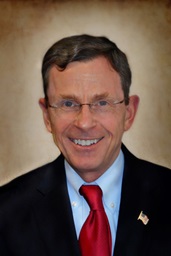Key points:
- Two United Methodists received World Methodist Peace Awards during a ceremony at the World Methodist Conference.
- Bishop Christian Alsted received recognition for his work in Ukraine, and deaconess Norma P. Dollaga for her work in the Philippines.
- Both delivered addresses on their peace work to a gathering of Christians who share their Wesleyan roots.
He has journeyed multiple times to war-ravaged Ukraine to provide spiritual leadership, comfort and connection to The United Methodist Church.
A continent and ocean away in the Philippines, she has advocated for the rights of poor people not to be killed.
While they serve in very different ministry contexts, both Nordic-Baltic-Ukraine Area Bishop Christian Alsted and Filipino deaconess Norma P. Dollaga share a commitment to The United Methodist Church. They also both risked their lives for the cause of peace.
They share yet another distinction: Each on Aug. 15 received a World Methodist Peace Award, the highest honor bestowed by the World Methodist Council.
“This award is presented annually, and it is not just for Methodists but for people who exhibit courage, creativity and consistency,” said Bishop Ivan M. Abrahams, the outgoing general secretary of the World Methodist Council.
He later explained how both Alsted and Dollaga are exemplars of those three virtues.
Abrahams presented both the 2023 award to Alsted and the 2024 award to Dollaga at a ceremony during the 22nd World Methodist Conference. The Aug. 14-18 gathering brings together some 1,100 representatives of World Methodist Council member denominations. The council is an ecumenical association of 80 denominations in 138 countries with roots in the Wesleyan tradition. The United Methodist Church is its largest member.
The World Methodist Conference first established the Peace Award in 1976 at its 13th gathering in Dublin, Ireland, and gave the first award the following year to Sadie Patterson for her work advocating for peace in Northern Ireland. The award includes a gold medallion, a citation and U.S. $1,000 in recognition for the recipient’s achievements in peace, justice and reconciliation.
Alsted and Dollaga join a company of award recipients that also includes the late Egyptian President Anwar Sadat, former U.S. President Jimmy Carter and the late South Africa President Nelson Mandela.
They also each delivered their award addresses in a city about a four-hour drive from Oslo, Norway, where the Nobel Peace Prize is presented every December.
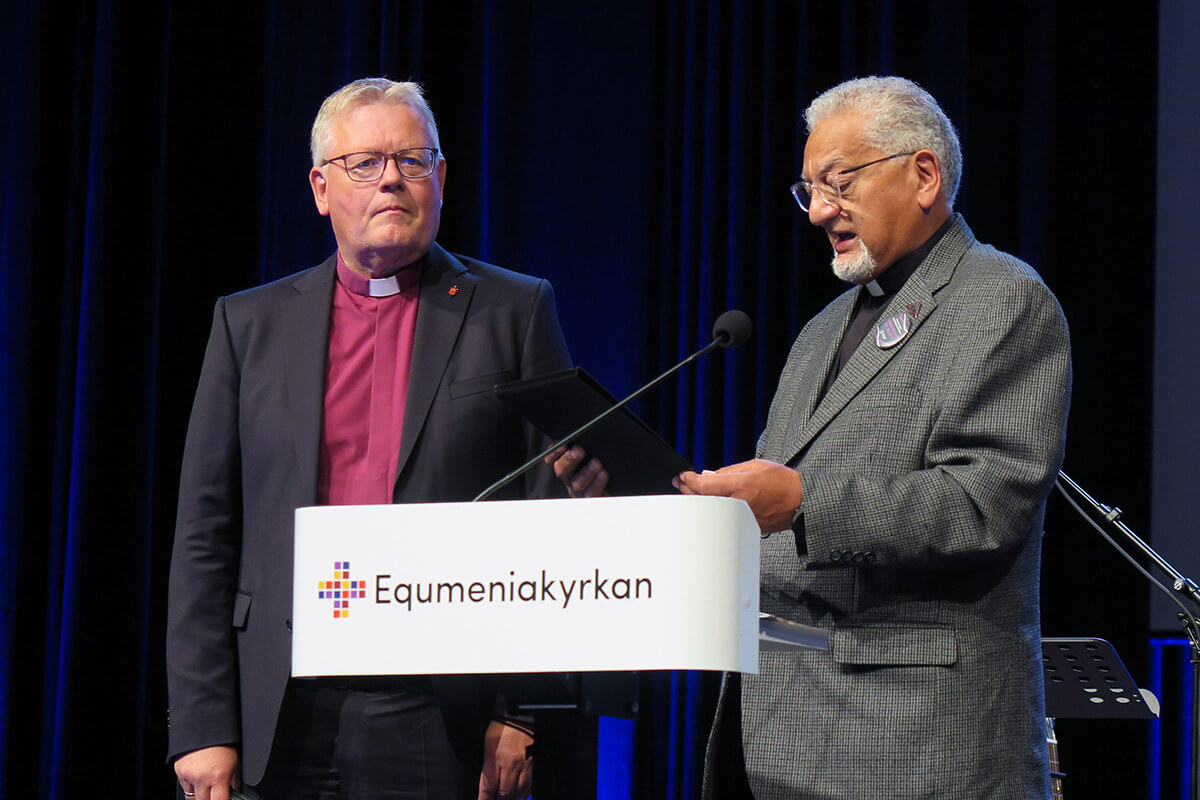
Bishop Alsted
After Russia invaded Ukraine in February 2022, Alsted stepped up when it became impossible for Moscow-based United Methodist Bishop Eduard Khegay to provide oversight in Ukraine and neighboring Moldova.
Since the start of the war, Alsted has visited Ukraine at least seven times — offering Christian care and fostering connections between Ukrainian United Methodists and The United Methodist Church worldwide. He also meets with Ukrainian United Methodist leaders each week online.
With Ukrainian United Methodist leadership, he now is developing a Methodist Center in Ukraine that will support internally displaced people with humanitarian aid as well as psychological support for dealing with post-traumatic stress.
Abrahams, in reading the citation, said the World Methodist Council was recognizing Alsted “for courage in challenging churches, governments and organizations to assist the people of Ukraine and to treat all persons as worthy of justice.” The citation also noted that Alsted faced danger to meet with Ukrainians in order to meet their needs.
In his award address, Alsted — who is based in Copenhagen, Denmark — stressed that Ukrainians face danger daily and that he shares the reward with the United Methodists and other Christians in the war-battered country.
“I come to visit from time to time and serve among them,” he said. “But afterwards, I travel back to my own country and my own region, where there is peace, while the Ukrainians continue to live their daily lives in the tumult of war. They live with the fear and the insecurity. They hear the air-raid alarms. They go to the bomb shelters. They care for the internally displaced. … They point to Christ and they share our hope in him, and I have the deepest respect for them.”
He said that the peace Christ provides offers a guide for a way forward.
“The prerequisites for peace are freedom, truth and justice,” he said. “When any of these is absent, there can be no peace. Right now, peace in Ukraine seems far away. Nevertheless, we must practice peace.”
The Rev. Yulia Starodubets and her family are among a small contingent of Ukrainians attending the World Methodist Conference. She said Ukrainian United Methodists are so grateful for the support Alsted brought to help them through the war.
“He even went to Kyiv,” she said. “He also is in very close touch with us through the regular online meetings. In these meetings, he provides to us pastoral support and prays with us. He listens to us about our struggles, and we feel emotionally supported by him as well.”
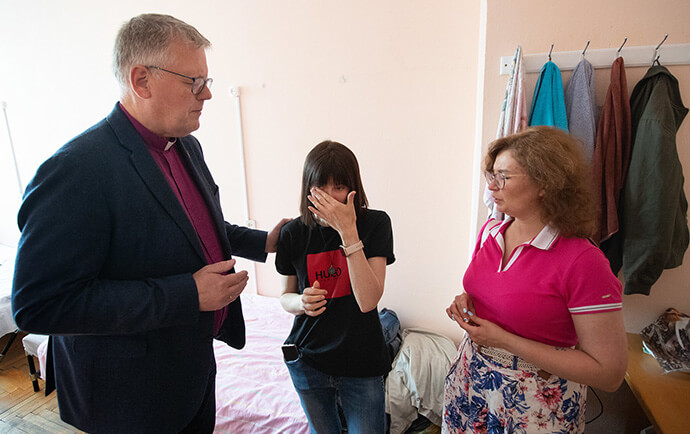
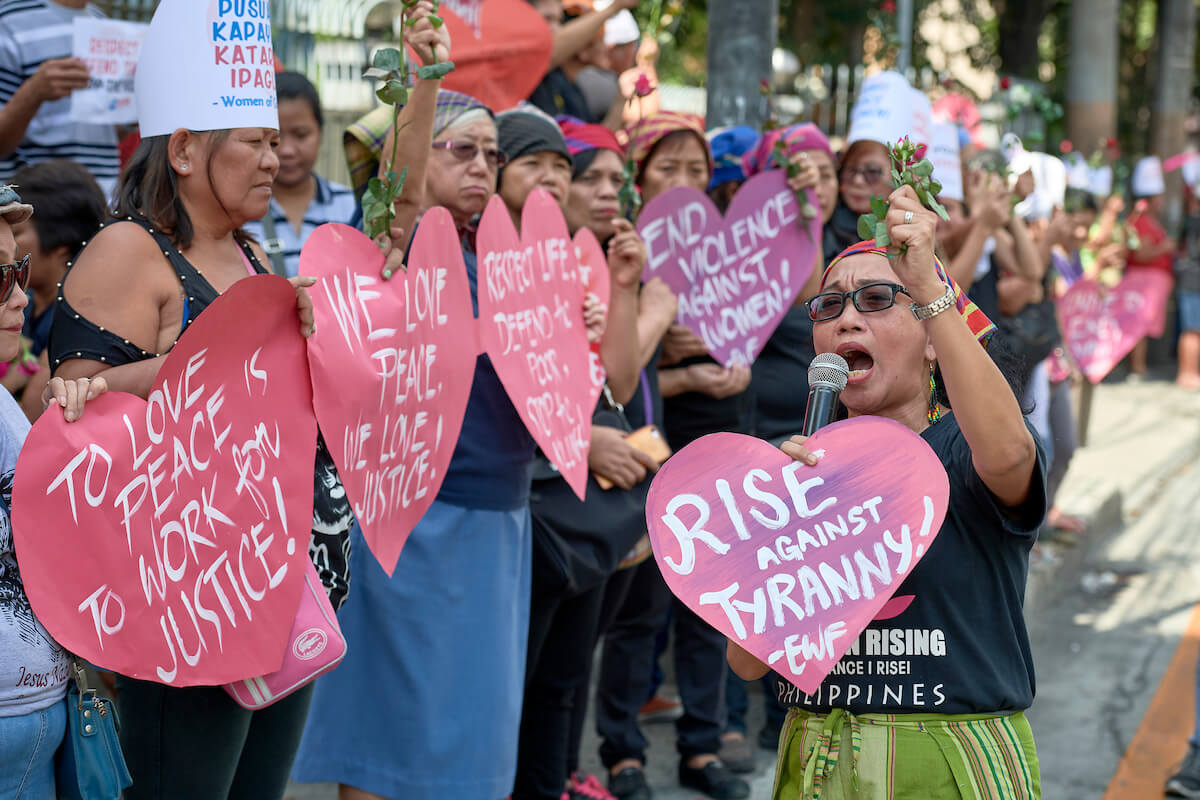
Deaconess Dollaga
For decades as a deaconess, Dollaga has long been a peace activist and advocated for Filipinos on the margins.
Deaconesses and home missioners are United Methodist lay people called to ministries of love, justice and service. In the Philippines, the office of deaconess is a prime way for many women to serve the church, and Dollaga long has been a mentor to deaconesses and other Christians.
Since 2000, she has served as top executive of the Ecumenical Center for Development. She also frequently teaches at Harris Memorial College, her alma mater and a training ground for deaconesses and other women leaders.
Dollaga also inspired other deaconesses and fellow Filipinos to respond when “the war on drugs” declared in 2016 by then President Rodrigo Duterte turned into a war on poor people who used drugs. Unidentified masked men on motorcycles would go through urban slums at night, with a list of people to kill. Though no official number of deaths was ever reported, it is likely in the thousands — perhaps tens of thousands. No court of law was involved.
Dollaga co-founded Rise Up for Life and for Rights, an ecumenical alliance to campaign against these extrajudicial killings. Rise Up both documented the violence and provided support to victims’ families. She also organized prayer vigils and memorial services to remember the victims.
Subscribe to our
e-newsletter
Abrahams said she had “the special gift of empowering others to join the struggle for justice and peace, working in the trenches herself to move others forward.”
Dollaga recounted how a mother told her that she planned to go to church to ask God why her son was killed, but then the church came to her through the deaconesses, pastors and priests involved in Rise Up. “God revealed himself through you,” the woman told Dollaga and her fellow peace activists.
“We cannot afford to lose justice,” Dollaga added to a chorus of “Amens” from people at the conference.
“So we will fight for it with all victims of injustice.”
She said she shares her award with the blessed ones whom Jesus lifts up in the Beatitudes, “those who suffer the most, those who rise up and choose ways of struggle to fight for justice and peace, those who are serving the least … and resisting the evils of oppression and exploitation.”
The Rev. Liberato “Levi” Bautista, a fellow Filipino who heads the United Nations office for the United Methodist Board of Church and Society, said the award was not just an affirmation of Dollaga and her fellow deaconesses but also the people she serves: victims of human rights violations.
“I think both the World Methodist Council and she are both honored by this award,” he said. “The World Methodist Council honors her, but they’re honored by having her.”
Hahn is assistant news editor for UM News. Contact her at (615) 742-5470 or [email protected]. To read more United Methodist news, subscribe to the free Daily or Friday Digests.


